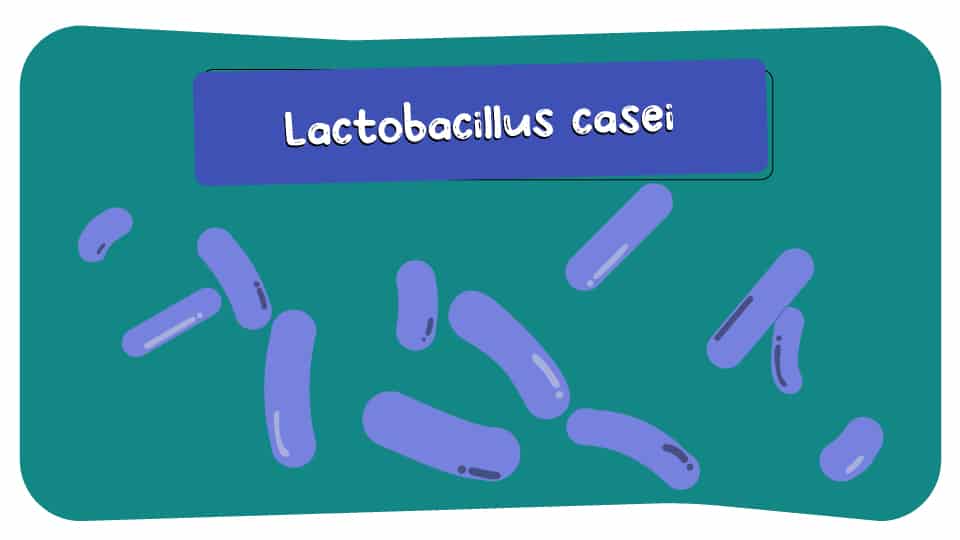5 Lactobacillus Casei Health Benefits: Digestion, Lactose and Wellness

Lactobacillus Casei, a strain of probiotic bacteria, has gained significant attention for its potential health benefits. It is found in the intestinal tract and fermented foods such as cow's milk kefir, kimchi and cheese.
From reducing diverticulitis episodes to improving digestion symptoms of IBS, positively impacting chronic constipation, and alleviating lactose intolerance symptoms, Lactobacillus Casei demonstrates its potential as a valuable addition to your wellness routine.
In this blog post, I will evaluate 5 human health benefits of Lactobacillus Casei.
1. Reduces Diverticulitis Episodes
Diverticulitis is a condition characterized by inflammation or infection of small pouches, called diverticula, that develop in the lining of the digestive system, particularly the colon.
A study involved 21 participants from four general practices who were given Yakult, a probiotic drink, to consume daily for one year. The researchers compared the number of diverticulitis attacks diagnosed in the six months before and after probiotic intervention. They also evaluated gastrointestinal symptoms using validated questionnaires and diet diaries at various time points.
Results indicated that among participants who consistently took the probiotic, 14 out of 21 (two-thirds) experienced symptom improvement (p=0.025). The occurrence of diverticulitis episodes was reduced by 50% during the study period compared to the preceding 12 months (7 vs 14 cases; p=0.021). Additionally, there was a significant improvement in gastrointestinal symptom scores (p<0.001).
In conclusion, the researchers found that daily probiotic consumption was associated with a lower rate of diverticulitis episodes and improvement in gastrointestinal symptoms. They suggested the feasibility of conducting a definitive trial in a primary care setting but recommended the inclusion of a method to validate diverticulitis diagnosis in future studies. These findings indicate that probiotics could be a promising adjunctive therapy for managing diverticulitis and enhancing patients' quality of life.
2. Strengthens The Intestinal Barrier
The intestinal barrier refers to the protective layer of cells and tissues lining the intestines that selectively allow the absorption of nutrients and prevent the entry of harmful substances, pathogens, and toxins into the bloodstream.
This groundbreaking study, which appeared in the PLOS One journal in 2011, delved into the potential therapeutic effects of Lactobacillus casei DN-114 001 on inflammatory bowel disease, as well as leaky gut syndrome.
In this animal model, L. Casei demonstrated a significant reduction in the severity of acute dextran sulfate sodium-induced colitis, prompting researchers to investigate additional markers related to intestinal permeability and inflammation.
Remarkably, the study found that L. Casei treatment not only strengthened the integrity of the intestinal barrier, but also increased the number of regulatory T cells in the mesenteric lymph nodes.
Additionally, the probiotic decreased pro-inflammatory cytokine production, while increasing anti-inflammatory cytokine production in the gut, and altered the microbiota composition.
These findings suggest that L. Casei may have potential therapeutic benefits in the treatment of both inflammatory bowel disease and leaky gut syndrome.
3. Improves Digestive Symptoms
IBS digestive symptoms refer to a range of gastrointestinal discomfort and irregularities commonly experienced by individuals with irritable bowel syndrome, including abdominal pain, bloating, diarrhea, and constipation.
In a 2018 randomized controlled trial, Lactobacillus Casei LBC80R, a strain of probiotic bacteria, was found to improve symptoms of irritable bowel syndrome (IBS).
The trial involved 113 subjects who were randomly assigned to take either a daily capsule containing a combination of Lactobacillus acidophilus CL1285, Lactobacillus casei LBC80R, and Lactobacillus rhamnosus CLR2, or a placebo, for 12 weeks.
The active treatment was found to improve several symptoms of IBS, including abdominal pain, distention, stool consistency and frequency, and quality of life in the patients taking the L. Casei strain.
This treatment was particularly effective in female participants with diarrhea-predominant IBS (IBS-D). Adverse events were generally mild or moderate, with only one severe case of cramping reported in the active treatment group, which eventually passed.
4. Positively Effects Chronic Constipation
Chronic constipation is a persistent condition characterized by infrequent bowel movements, difficulty passing stool, and a feeling of incomplete emptying, often lasting for an extended period of time.
A 2003 clinical trial published in the Canadian Journal of Gastroenterology and Hepatology found that consuming Yakult containing Lactobacillus Casei Shirota significantly improved gastrointestinal symptoms in patients with chronic constipation.
The study included 75 patients who were randomly assigned to either consume Yakult containing L. Casei Shirota or a placebo, twice daily for four weeks. The results showed that 89% of the L. Casei group experienced a positive effect on constipation, compared to only 56% of the placebo group.
No adverse reactions were reported during the study, and the researchers concluded that the L. Casei strain may be an effective adjunctive therapy for chronic constipation, but it is not a cure.
5. Improves Lactose Intolerance Symptoms
Lactose intolerance symptoms encompass digestive issues such as bloating, gas, diarrhea, and abdominal discomfort that occur after consuming dairy products due to the body's inability to fully digest lactose, the sugar found in milk and dairy.
A 2012 study published in the Nutrition in Clinical Practice journal examined the effects of a probiotic combination containing Lactobacillus casei Shirota and Bifidobacterium breve Yakult on lactose-intolerant patients.
The study involved 27 participants who underwent four hydrogen breath tests: baseline, after taking lactase, after four weeks of probiotic supplementation, and a follow-up test three months after discontinuing the probiotic.
Results showed that the probiotic combination significantly reduced symptom scores and breath hydrogen levels compared to the baseline condition. These effects persisted even after probiotic consumption was suspended for three months.
The researchers concluded that a four-week course of this probiotic combination may improve symptoms and decrease hydrogen production in lactose-intolerant patients.
This suggests that Lactobacillus Casei could potentially benefit those who are lactose intolerant and struggle to digest milk. It may even be useful for individuals who prefer vegan yogurt alternatives but still experience lactose intolerance.
Does L. Casei Have Side Effects?

Yes, L. Casei has side effects for some people. While probiotics are generally considered safe, it is important to note that they can have different effects on individuals depending on their unique gut flora. Some people taking probiotics may experience side effects such as gas, bloating, diarrhea, or abdominal discomfort.
If you experience any side effects while taking probiotics, it is important to consult with a healthcare professional as soon as possible and consider discontinuing use.
Additionally, certain individuals with weakened immune systems or underlying medical conditions may be at a higher risk for adverse effects, and should always consult with their doctor before starting a probiotic regimen.
It is also important to follow the recommended dosage and storage instructions on the probiotic product label to ensure safety and effectiveness.
Dr. Sara Mesilhy has a Master’s degree in Gastroenterology and holds a membership with the Royal College of Physicians of the United Kingdom. She completed her Bachelor of Medicine, Bachelor of Surgery (MBBS) at Cairo University and is currently part of the ProbioticReviewGirl medical team.